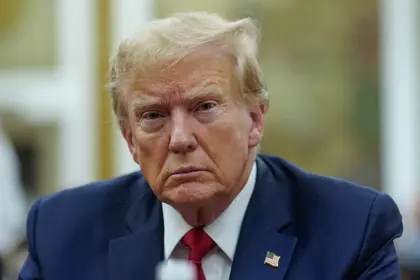Donald Trump became the first former US president ever convicted of a crime after a New York jury found him guilty on all charges in his hush money case, months before an election that could see him yet return to the White House.
The jury found him guilty on each of the 34 counts of falsifying business records to hide a payment meant to silence porn star Stormy Daniels. He could in theory be sentenced to four years behind bars for each count but is more likely to receive probation.
JOIN US ON TELEGRAM
Follow our coverage of the war on the @Kyivpost_official.
The 77-year-old Republican, who was released without bail, is now a felon -- a historic and startling first in a country where presidents are frequently described as the most powerful man in the world.
Trump, however, is not barred from continuing his battle to unseat President Joe Biden in November -- even in the unlikely event he goes to prison. And he voiced immediate defiance.
“I’m a very innocent man,” Trump told reporters, vowing that the “real verdict” would come from voters. He branded the trial “rigged” and a “disgrace.”
Biden’s campaign issued a statement saying the trial showed “no one is above the law.” It added that “the threat Trump poses to our democracy has never been greater.”
Judge Juan Merchan set sentencing for July 11 -- four days before the Republican National Convention in Milwaukee, where Trump is due to receive the party’s formal nomination.

‘A National Embarrassment’ – Trump Pardons 1,500 Rioters Who Stormed US Capitol
The 12-member jury had deliberated for more than 11 hours over two days before the foreman read out the unanimous conclusion within a matter of minutes.
Merchan thanked the jurors for completing the “difficult and stressful task.”
Their identities had been kept secret throughout proceedings, a rare practice more often seen in cases involving mafia or other violent defendants.
Trump also faces federal and state charges of conspiring to overturn the results of the 2020 election won by Biden, and for hoarding secret documents after leaving the White House.
However, those trials -- on far weightier alleged crimes -- are unlikely to get underway before the presidential election.
Election conspiracy
Trump was convicted of falsifying business records to reimburse his lawyer, Michael Cohen, for a $130,000 payment to Daniels on the eve of the 2016 election, when her claim to have had sex with him could have proved fatal to his campaign against Hillary Clinton.
The trial featured lengthy testimony from the adult performer, whose real name is Stephanie Clifford and who described to the court in graphic detail what she says was a 2006 sexual encounter with the married Trump.
Prosecutors successfully laid out a case alleging the hush money and the illegal covering up of the payment was part of a broader crime to prevent voters from knowing about Trump’s behavior.
Cohen, who was the key witness as a tainted former aide who had turned on his old boss, called the verdict “an important day for accountability and the rule of law.”
Trump has denied any sexual encounter with Stormy Daniels, but did not testify in his own defense. His lawyers argued that any payments made to the performer were entirely legal.
Campaigning from courthouse
The trial has distracted Trump in his campaign to unseat Biden.
However, he milked the media attention throughout, with daily speeches in front of cameras outside the courtroom in which he complained about being a political victim.
Shortly after the verdict was issued, Trump’s campaign put out a fundraising appeal, titled “I am a political prisoner!”
Keith Gaddie, a political analyst and professor at Texas Christian University, said the political impact of the shocking events has yet to be determined.
“It probably doesn’t move a lot of votes, but in particular states with particular swing votes, it could matter around the margins. So in particularly tight races, it can tip things back from one direction to the other,” she said.
The Republican, who made his name as a brash real estate mogul before a stunning ascent to the nation’s highest office in the 2016 election, most likely faces probation, because he is a first-time convict.
An appeal is all but certain, but could take months to complete.
Should he win the presidency he will not be able to pardon himself, given that the case was brought not by the federal government but by the state of New York, where only the governor could clear his name.
You can also highlight the text and press Ctrl + Enter










